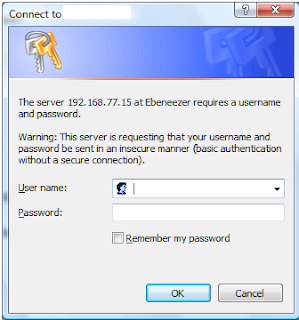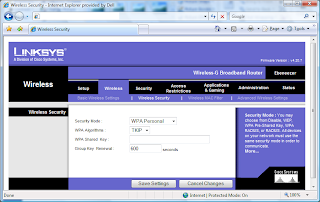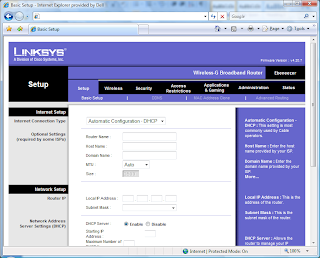Step 3 - Configure WPA-PSK on Windows XP
This part has already been detailed elsewhere. Go see the "Configure WPA-PSK on Windows XP" section of this page:
http://www.microsoft.com/windowsxp/using/networking/expert/bowman_03july28.mspx
Friday, October 31, 2008
Securing your Wireless network with XP systems, Step 2 of 3
- Step 2 – Configure your wireless router to use WPA
Go to your desktop machine that’s plugged in to the network (not wireless). Point your browser at http://192.168.1.1 which is the default address for most Linksys routers. This is the configuration page for your router, not some website on the internet.
A box asking for your password should pop up, like this:

Leave the User name blank. If you’ve set a password, enter it. Otherwise, the default password on linksys routers is usually: admin
You’ll get into the router’s opening screen, which looks like this:

At the top of the page, click on “Wireless” and then “Wireless Security in the tab below it. Choose settings and a strong “WPA Shared Key”, like this:

If you really want a strong key that will drive everyone nuts, go to this web page: https://www.grc.com/passwords.htm
Regardless, make sure to paste a copy of your “WPA Shared key” into a text file and save it on your desktop computer. A handy way to get this key to your laptops is to copy that file to a USB stick if you have one handy.
Then click Save Changes at the bottom of the page and your router’s good to go.
Securing your Wireless network with XP systems, Step 1 of 3
Step 1 – Verify all your XP systems support WPA
You can tell if your XP system has the updates by right clicking on "My Computer" (located on the Desktop or Start Menu) and choosing "Properties." You'll see a screen pop up that looks like this:

from http://helpdesk.gwu.edu/security/images/winver.xp.gif
Note the "Service Pack #" listed under "System."
-If the number is 2 or 3, then your system is up to date with WPA compatibility.
-If its 1 or not there at all, I strongly recommend going to http://windowsupdate.microsoft.com and installing the latest service pack. Otherwise, you're leaving yourself wide open to all sorts of vulnerabilities that MS fixed in those Service Packs and you probably shouldn't be connected to the internet.
You can tell if your XP system has the updates by right clicking on "My Computer" (located on the Desktop or Start Menu) and choosing "Properties." You'll see a screen pop up that looks like this:

from http://helpdesk.gwu.edu/security/images/winver.xp.gif
Note the "Service Pack #" listed under "System."
-If the number is 2 or 3, then your system is up to date with WPA compatibility.
-If its 1 or not there at all, I strongly recommend going to http://windowsupdate.microsoft.com and installing the latest service pack. Otherwise, you're leaving yourself wide open to all sorts of vulnerabilities that MS fixed in those Service Packs and you probably shouldn't be connected to the internet.
Why I Insist on Securing Networks
I sent this e-mail out to some friends and family and figured it might solve someone's problem out there, as well.
***Steps up on soap box***
See this article for an example of why I insist on securing networks when folks ask for my help or opinion.
http://www.dailytech.com/article.aspx?newsid=13330
The summary is that an elderly couple was recently threatened to pay over $800 to avoid being sued for illegally distributing a racing video game. The threat was based solely on evidence that their network IP address was involved in the file share. In this case, the charges were dropped when enough bad publicity occurred since the couple was obviously not involved. It was not reported exactly how their network IP address was used in the alledged illegal activity.
One way this problem could occur is if the couple had an unsecured wireless router and a nearby irresponsible or malicious individual decided to switch to their network. That individual could be a neighbor or could be someone who parked out at the curb with a laptop for a few minutes. If its your network, whatever that person does becomes your problem because it points back to the IP address your Internet Service Provider (ISP) assigned to you. ISPs are required to log which customer had which IP address at what times and they willingly provide that information when requested by litigious companies. ISPs generally do not risk getting sued themselves to protect their customers. Lock your wireless network down with Wireless Protected Access (WPA) and a strong password, and you can't be exploited this way.
***Steps down off soap box***
***Steps up on soap box***
See this article for an example of why I insist on securing networks when folks ask for my help or opinion.
http://www.dailytech.com/
The summary is that an elderly couple was recently threatened to pay over $800 to avoid being sued for illegally distributing a racing video game. The threat was based solely on evidence that their network IP address was involved in the file share. In this case, the charges were dropped when enough bad publicity occurred since the couple was obviously not involved. It was not reported exactly how their network IP address was used in the alledged illegal activity.
One way this problem could occur is if the couple had an unsecured wireless router and a nearby irresponsible or malicious individual decided to switch to their network. That individual could be a neighbor or could be someone who parked out at the curb with a laptop for a few minutes. If its your network, whatever that person does becomes your problem because it points back to the IP address your Internet Service Provider (ISP) assigned to you. ISPs are required to log which customer had which IP address at what times and they willingly provide that information when requested by litigious companies. ISPs generally do not risk getting sued themselves to protect their customers. Lock your wireless network down with Wireless Protected Access (WPA) and a strong password, and you can't be exploited this way.
***Steps down off soap box***
Thursday, March 6, 2008
Air Force buying PS3s
I read in yesterday's news that the US Air Force is looking to buy 300 PS3s. Funny quips aside, this is probably a smart thing to do. Why is buying a video game console for military use a smart idea? The Cell Broadband Engine (BE) chip in each of those PS3s is an extremely powerful processing platform. It has proven itself to be a processing powerhouse in applications like encryption/decryption, signal processing, physics simulation, and modelling protein folding for medical research. Its combination of multi-threading power, triple buffering, and rediculous memory bandwidth are perfect for performing lots of calculations on lots of data. If you want to buy a Cell BE chip, you can go through vendors such as Mercury Computer Systems and spend 10s of thousands on hardware alone to get up and running, then thousands more on training per developer. Alternatively, you can buy PS3s for a few hundred dollars each, download an open source OS and developer tools for free, and start exploring their potential right away for a much lower price. I looked into this for accelerating physics simulations run at my office and, were we to go the Cell route, that would be the way to start.
Comments
Ever comment on a blog or news site and never hear back? I think part of my motivation for starting this blog comes from the disappointment of posting to tech news and review sites. It seems like the more useless and the less thoughtful the post, the more people respond to it. Its also frustrating that you have to repeatedly load the page to see responses. Sure, most forums have some kind of "inform me of responses by e-mail" checkbox but I've found them to be unreliable, at best.
That said, feel free to post comments here. I may even look at them.
That said, feel free to post comments here. I may even look at them.
Destined for Deadwood
I figured it was about time I did more than listen. Lately, I've been listening to so many podcasts, its driven my girlfriend mad. Most of these podcasts I find myself listening to, like much of the content on the web, are about the web. Most of those are from the perspective of someone in Silicon Valley or, at least, someone tuned into that culture. I'm an east-coast guy and, until it can do something for me besides confuse me further, I'm not terribly interested in the latest social networking site, widget-making startup, or google wannabe. So, my girlfriend will probably still regret getting me an iPod for christmas, but at least she won't have to listen to me blather about all the geeky stuff I heard on it anymore. My devoted readers can come here for that;) Welcome, loyal reader. I'll try to pretend you're not alone.
Subscribe to:
Posts (Atom)


